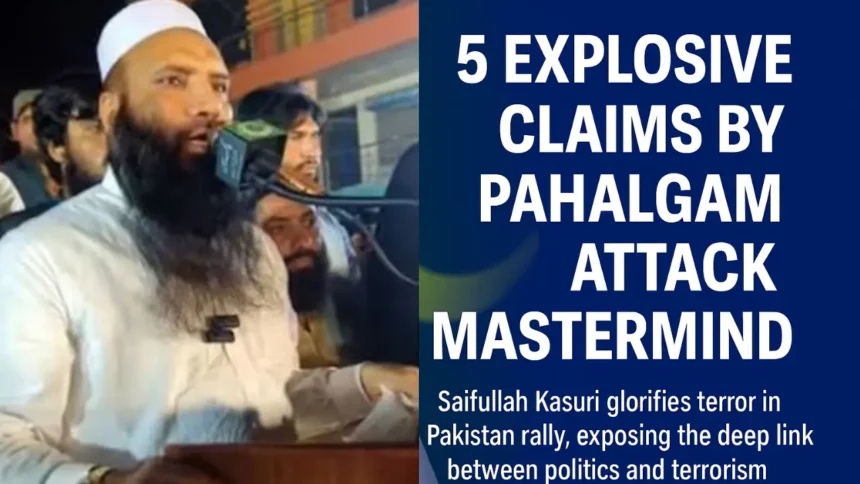Pahalgam Attack Mastermind and Pakistan’s Terror Politics
Saifullah Kasuri’s open rally with Pakistani political figures exposes the deep nexus between terrorism and politics in Pakistan. By glorifying terror and gaining public platforms, masterminds like Kasuri highlight how Pakistan’s system enables extremism instead of eradicating it—posing a continued threat to regional peace and stability.
In a fresh wave of controversy, Lashkar-e-Taiba commander Saifullah Kasuri—infamously linked to the Pahalgam terror attack—has again made headlines. This time, it’s for a hate-filled rally in Pakistan, where he stood proudly with fellow radicals and made explosive statements against India.
But this wasn’t just any hate speech. It revealed deep-rooted terror ties, political hypocrisy, and shocking admissions—all on public display.
Let’s break down the 5 most outrageous revelations made by Kasuri and his associates at this rally—and what they mean for India, Pakistan, and global security.
1. “I’m Famous Now”—Kasuri Glorifies the Pahalgam Attack
In what many are calling a disgraceful moment of arrogance, Saifullah Kasuri stood before a cheering crowd and said:
I was held responsible for the Pahalgam terrorist attack. Now, my name is known all over the world.
Though he previously denied involvement in the Pahalgam attack, this latest remark all but confirms his role—or at the very least, his pride in it.
This chilling admission is not just a sign of emboldenment but a dangerous call to glorify terrorism.
2. Pakistani Political Leaders Share Stage with Terrorists
One of the most alarming aspects of the rally was the visible presence of Pakistani politicians sharing space with wanted terrorists.
Organized by the Pakistan Markazi Muslim League, the rally featured Talha Saeed—son of 26/11 mastermind Hafiz Saeed—and many radical leaders. Talha, who is ranked 32nd on India’s most wanted list, echoed Kasuri’s anti-India rhetoric, shouting:
Takbir! The land will tremble under our voice.
The open involvement of Pakistani leaders in a terror rally raises tough questions for the international community.
3. “We’ll Build a Hospital in a Terrorist’s Name”
In another shocking announcement, Kasuri said he plans to build a hospital in the name of terrorist Mudasir Ahmed, who was killed during India’s Operation Sindoor—a counter-terror offensive that eliminated over 100 terrorists.
This isn’t charity—it’s hero worship for a slain militant. It sends a message: “Terrorists are martyrs, not murderers.”
Kasuri’s bizarre tribute underlines how Pakistan glorifies terrorism while ignoring the pain of thousands of Indian families affected by cross-border violence.
4. Terrorists in Politics: From Guns to Ballots?
Believe it or not, Kasuri and other Lashkar-linked terrorists have contested elections in Pakistan. While they haven’t secured major wins, their political ambitions reveal something disturbing:
Terror and politics are becoming interchangeable in Pakistan.
The lines are blurred. Militants are no longer hiding—they’re contesting votes and giving speeches at rallies. This dangerous normalization must not be ignored.
5. Pakistan’s Own Admission: “We Nurtured Terrorism”
What makes this situation more serious is that even Pakistan’s own ministers have admitted their hand in nurturing terrorism.
In the past, top Pakistani officials, including its foreign minister, openly accepted that the country has been funding and harboring terrorists for decades.
These acknowledgments, combined with public rallies like Kasuri’s, show that Pakistan is not just a safe haven for terrorism—it’s actively supporting it, both ideologically and politically.
Operation Sindoor: India Strikes Back
India launched Operation Sindoor in the wake of the Pahalgam attack—a swift, precise, and devastating campaign that neutralized over 100 terrorists.
- Terrorist hideouts in Pakistan-occupied Kashmir (POK) were dismantled.
- High-profile terrorists like Mudasir Ahmed were killed.
- The message was clear: India will not stay silent.
Operation Sindoor was a turning point. It showed the world that India is prepared to fight terror head-on.
Why the World Must Wake Up
The rally featuring Kasuri and Talha Saeed isn’t just another angry speech—it’s a wake-up call for the global community.
- Terrorists are no longer hiding in caves—they’re out in the open, organizing rallies.
- Politicians are no longer opposing terror—they’re standing beside it.
- Pakistan is not just tolerating extremists—it’s celebrating them.
India has long raised the issue of Pakistan’s terror links at the UN and global platforms. But the world must do more. Sanctions, blacklisting, and removal from global aid programs must follow if Pakistan continues on this path.
Final Thoughts: India’s Bold Response to a Growing Terror-Politics Nexus
The rally led by Pahalgam attack mastermind Saifullah Kasuri, alongside Talha Saeed, exposes a dangerous alliance between terrorism and politics in Pakistan. This isn’t just isolated hate speech—it’s a glimpse into a deeply-rooted terror ecosystem. Yet, India has stood firm. With decisive actions like surgical strikes and Operation Sindoor, India has demonstrated unwavering resolve against terrorism.
These responses send a clear message: acts of terror will be met with strength, strategy, and the united will of a sovereign nation.
Most read: https://tnheadlines24.com/munirs-fantasy-talk-rafale-lies-water-threats/
Also read: https://tnheadlines24.com/pm-modis-bold-warning-to-pakistan-in-bengal/
Want to stay updated on India’s counter-terror moves?
Follow TN HEADLINES24 for exclusive updates, real-time insights, and deep-dive stories on defense, geopolitics, and security.
Subscribe to our newsletter for breaking stories before they go mainstream.
Disclaimer: The views, statements, and actions described in this article, including those made by the Pahalgam Attack mastermind Saifullah Kasuri and other individuals, are solely their own and do not reflect the views of TN HEADLINES24. This article is intended for informational purposes only. TN HEADLINES24 is not responsible for the accuracy, opinions, or consequences arising from the statements made by any third parties mentioned herein.

